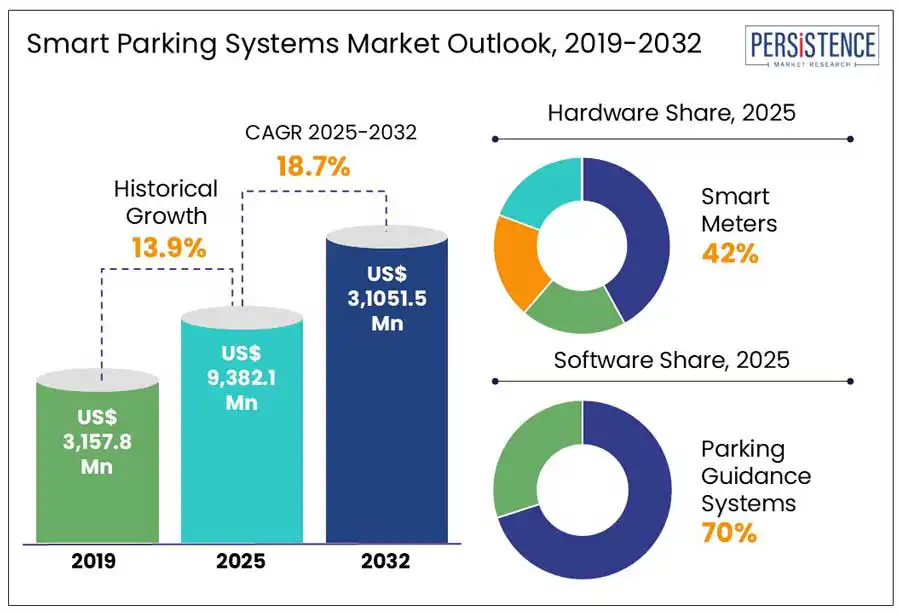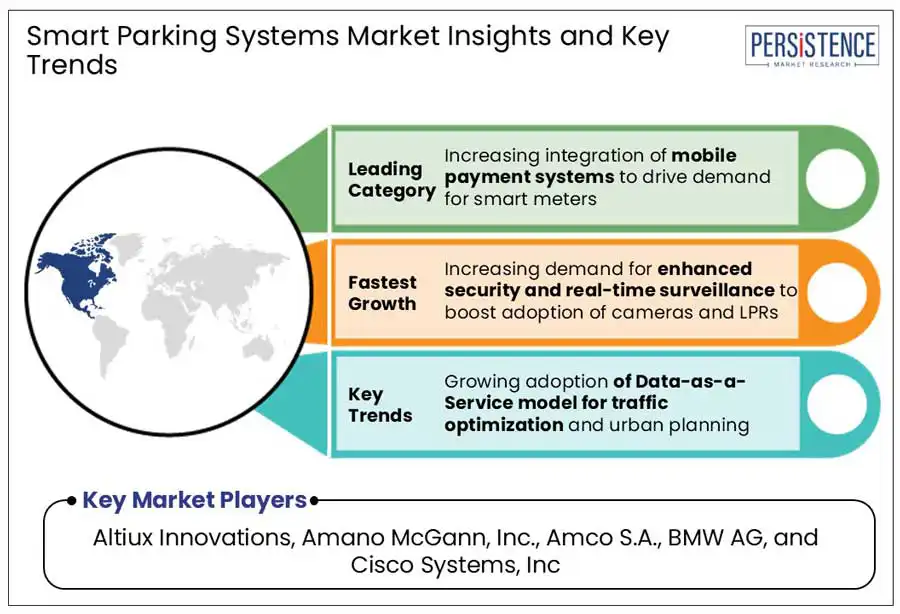Comprehensive Snapshot of Smart Parking Systems Market Including Regional and Country Analysis in Brief.
Industry: Industrial Automation
Published Date: April-2025
Format: PPT*, PDF, EXCEL
Delivery Timelines: Contact Sales
Number of Pages: 140
Report ID: PMRREP35207
The global smart parking systems market size is anticipated to be valued at US$ 9,382.10 Mn in 2025 and projected to grow by US$ 31,051.50 Mn at a CAGR of 18.7% by 2032.
Rapid pace of urbanization, rising vehicle ownership, and the growing strain on traditional parking infrastructure drive the demand for advanced smart parking systems globally. Today, various countries are embracing these solutions to tackle traffic congestion, reduce emissions, and improve commuter convenience. For example, in Barcelona, smart parking network powered by Internet of Things (IoT) sensors and mobile apps, has cut traffic by 21% in high-density areas by guiding drivers to available spaces in real time. Similarly, San Francisco’s SFpark program integrates dynamic pricing and real-time data to optimize parking availability and reduce cruising time.
These real-life use cases highlight the importance of smart parking solutions to enhance modern, sustainable urban mobility. Besides, prominent companies such as Siemens AG, Amano Corporation, Robert Bosch GmbH, Cubic Corporation, and others are highly leveraging with integrated hardware, software, and mobile-enabled solutions. Along with private sector, government is focus on investing large in smart infrastructure which is likely to create exciting growth opportunities for private companies.

Key Industry Highlights
|
Global Market Attribute |
Key Insights |
|
Smart Parking Systems Market Size (2025E) |
US$ 9,382.10 Mn |
|
Market Value Forecast (2032F) |
US$ 31,051.50 Mn |
|
Projected Growth (CAGR 2025 to 2032) |
18.7% |
|
Historical Market Growth (CAGR 2019 to 2024) |
13.9% |
Smart parking systems have evolved beyond their primary function of managing vehicle spaces. They now serve as critical data hubs within urban setting. By collecting and analyzing information on vehicle occupancy, driver behaviors, and payment patterns, these systems generate valuable datasets. This data helps governments and other industries such as BFSI, Automotive, Telecom, Real Estate, and Retail to enhance urban planning, optimize traffic flow, and provide dynamic pricing. As a result, the growing adoption of data-as-a service (DaaS) model is anticipated to drive the market growth during the forecast period.
A striking example of integrating DaaS model in smart parking systems is the city of Pardubice in the Czech Republic. In February 2024, an extensive smart parking system was implemented with IoT sensors and a centralized management platform. This system enhances parking efficiency and provides real-time data that enables informed city planning decisions and optimized resource allocation. The data facilitates dynamic pricing models and enhanced enforcement strategies, leading to increased revenue and reduced congestion.
Smart parking systems require high initial investment in hardware, software, and infrastructure, with the return on investment (ROI) often realized over a long period. The delay in return on investments can be a significant hurdle, primarily in countries with tighter budgets. Besides, the financial and operational benefits take time and can discourage potential investors. For example, Los Angeles initiates the Los Angeles Smart Parking Initiative over a decade. The city invested significantly in sensor-based parking systems to optimize space usage. Though the initiative offered benefits such as reduced congestion and increased parking revenue, the revenue yield occurred at the fourth year. Therefore, high initial investment and delayed ROI discourages potential investors, resulting in slow growth.
Globally, governments are prioritizing smart mobility solutions as a part of broader smart city initiatives. This is anticipated to create new growth opportunities for the companies in the smart parking systems industry. For instance, Singapore’s Smart Nation initiative has integrated smart parking systems in its national urban infrastructure. This allows businesses to secure high-value government contracts, while benefitting from regulatory support and streamlined permits.
As governments focus on expansion of smart mobility ecosystem, parking solutions are likely to be an integral part of achieving seamless urban mobility. Such government-backed initiatives are expected to benefit companies through availability of public funding, long-term partnerships, and exciting opportunities for sustained growth.
By hardware, the market is segment into pucks, cameras & LPRs, smart meters, signage, and parking gates. Smart meter segment is anticipated to dominate and hold a share of about 42% in 2025. Smart meters when integrated with mobile payment systems, allow commuters to pay for parking through mobile applications. Besides, this integration facilitates seamless payment processing, while reducing operational costs for parking authorities. Therefore, the increasing adoption of digital payment systems is likely to boost the segment growth.
On the other hand, cameras and License Plate Recognition (LPR) is expected to be the fast-growing segment during the forecast period. The increasing demand for enhanced security in urban areas is projected to boost the adoption of cameras and LPR systems. These technologies provide real-time surveillance and can detect unauthorized vehicles, ensuring better enforcement of parking regulations. They also serve as a deterrent to illegal parking and can be linked with local law enforcement to track stolen or suspicious vehicles.
By software, the market is segmented into parking guidance systems and analytics solutions. Out of these, the parking guidance system segment is projected to hold a share of about 70% in 2025, fueled by increasing demand for real-time data driven solutions, parking optimization solutions, and enhanced user experience. As urban areas expand and vehicle numbers increase, the need for effective parking management becomes more critical. Parking guidance systems help optimize the use of parking spaces by providing real-time information on available spots. This reduces the drivers time spent on searching for parking, thereby improving traffic flow and reducing congestion.
The analytics solutions, is expected to witness considerable growth during the forecast period. Analytics solutions can contribute to sustainability goals by optimizing parking usage and reducing traffic congestion, which in turn lowers carbon emissions. By improving parking efficiency, these solutions help cities reduce the amount of time vehicles spend idling or circling parking areas, thereby supporting environment-friendly urban development initiatives.

North America is expected to dominate and account for share of about 38% in 2025. Governments in both the U.S. and Canada have increasingly recognized the need for efficient urban mobility as congestion and parking-related issues intensify in urban centers. This has led to significant investments in IoT-based solutions, real-time data analytics, and automated parking management, all of which are key components of the smart parking systems industry. In addition, the presence of leading technology companies and startups focused on AI, machine learning, and IoT is anticipated to bolster the market growth in this region.
U.S. smart parking systems market is experiencing substantial growth, driven by increasing public-private partnerships and large-scale urban mobility initiatives. Major cities such as Los Angeles, San Francisco, and New York have adopted innovative parking management solutions such as sensor-based smart meters and dynamic pricing models, significantly improving urban parking efficiency.
The U.S. government's increasing focus on sustainability and smart infrastructure is also creating an ideal environment for companies offering parking solutions, ensuring steady demand for smart parking systems. Moreover, the country is embracing the integration of smart parking into broader smart city initiatives. This is anticipated to drive technological advancements and create significant growth opportunities for market players.
Asia Pacific is expected to witness fast-growth during the forecast period. The region is home to some of the largest cities such as Tokyo, Shanghai, and Mumbai. These countries encounter major concerns of parking and traffic congestion, which is driving the demand for AI-powered parking systems to optimize space and improve traffic flow. Moreover, proactive government initiatives are boosting the public-private partnerships to introduce advanced parking solutions. For example, in India, the Chandigarh Municipal Corporation initiated a project to implement smart parking solutions across 89 paid parking lots through a public-private partnership model. This initiative is aimed at optimizing parking space utilization and reducing congestion in the city.
China smart parking systems market is projected to register steady growth through 2032. Rising awareness regarding the benefits of parking systems and technological advancements in smart parking technologies is expected to support market growth in the country. For instance, in 2025, the Asia International Smart Parking Exhibition to be held in Chengdu, China showcases the latest advancements in smart parking solutions and technologies.
Europe is anticipated to witness a considerable growth from 2025 to 2032, driven by stringent government regulation to reduce emissions and increasing focus on vehicle electrification. With more cities focusing on becoming carbon-neutral by 2030, the integration of smart parking solutions with electric vehicle (EV) charging infrastructure is gaining traction. For instance, Amsterdam aims to reduce 60% carbon emissions by 2030 compared to 1990 levels, with the main objective is to achieve carbon neutrality by 2050. This alignment with sustainability goals creates substantial market opportunities for companies offering solutions that combine both smart parking and EV charging stations in this region.
The global smart parking systems market is characterized by the presence of established and emerging players. These companies are adopting strategies such as partnerships, merger and acquisition to strengthen their position. The competitive nature of the market is propelling the companies to focus on innovation to cater to the evolving needs of urban mobility and parking management. Companies are leveraging the expertise in data analytics, IoT, and sensor technologies to develop advanced parking solutions.
|
Report Attribute |
Details |
|
Historical Data/Actuals |
2019 - 2024 |
|
Forecast Period |
2025 - 2032 |
|
Market Analysis |
Value: US$ Mn |
|
Geographical Coverage |
|
|
Segmental Coverage |
|
|
Competitive Analysis |
|
|
Report Highlights |
|
|
Customization and Pricing |
Available upon request |
By Hardware
By Software
By Service
By Application
By Region
To know more about delivery timeline for this report Contact Sales

The global market is projected to value at US$ 9,382.10 Mn in 2025.
The market is driven by growing adoption of data-as-a-service model globally to enhance mobility solutions.
The market is poised to witness a CAGR of 18.7% from 2025 to 2032.
Increasing public-private partnerships and the growing adoption of IoT solutions to develop advanced smart parking solutions are the key market opportunities.
Major players in the smart parking systems industry include, Altiux Innovations, Amano McGann, Inc., Amco S.A., BMW AG, Cisco Systems, Inc., and others.